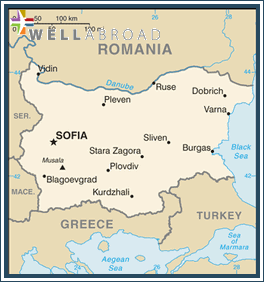|
MOST RECENT ALERTS
There's no recent alert.
|

|
|||||||||||||||
| COUNTRY OVERVIEW | ||||||||||||||||
|---|---|---|---|---|---|---|---|---|---|---|---|---|---|---|---|---|
|
| COUNTRY GENERAL INFORMATION | |||||||
|---|---|---|---|---|---|---|---|
| Language: |
Bulgarian 84.5%, Turkish 9.6%, Roma 4.1%, other and unspecified 1.8% |
||||||
| Currency: | Bulgarian Lev (BGL) | ||||||
| Predominant Religions: |
Bulgarian Orthodox (82.9%), Muslim (12.2%), Roman Catholic (1.7%) |
||||||
| National Holidays: | Liberation Day, 3 March (1878) | ||||||
| Economic Status: |
The Bulgarian government is committed to economic reform and responsible fiscal planning. A $300 million stand-by agreement negotiated with the IMF at the end of 2001 has supported government efforts to overcome high rates of poverty and unemployment. |
||||||
| Security: |
Bulgarian Armed Forces: Ground Forces, Naval Forces, Bulgarian Air Forces (Bulgarski Voennovazdyshni Sily, BVVS) |
||||||
| US Presence: |
U.S. Embassy in Sofia Fax number: +359 2 937 5320 |
||||||
| Document Requirements: |
A United States passport is required for U.S. citizens who are not also Bulgarian nationals. U.S. citizens who enter the country without a Bulgarian visa are authorized to stay for a total of 90 days within a six-month period. This law is strictly enforced. An application to extend one’s stay beyond the original 90 days can be filed for urgent or humanitarian reasons, but must be submitted to regional police authorities no later than five days prior to the end of the original 90-day period. Travelers who have been in the country for 90 days, and then leave, will not be able to re-enter Bulgaria before the six-month period expires. Travelers using official or diplomatic passports must secure visas prior to arrival. Upon entering the country, Bulgarian immigration authorities request that all foreigners declare the purpose of their visit and provide their intended address. For further information concerning entry requirements, travelers should contact the Embassy of the Republic of Bulgaria at 1621 22nd Street NW, Washington, DC 20008; http://www.bulgaria-embassy.org; tel. (202) 387-7969 (main switchboard (202) 387-0174), or the Bulgarian Consulate in New York City at 121 East 62nd Street, New York, NY 10021; http://www.consulbulgaria-ny.org; tel. (212) 935-4646. |
||||||
| Major Airports: |
Airports: 212, Airports w/paved runways: 128 Sofia International Airport EAD (SOF/LBSF) |
||||||
| Servicing Airlines: |
|
||||||
| Risks and Precautions: |
Goods and services taken for granted in other European countries may not be available in many areas of Bulgaria. A series of bombings and shootouts have occurred in public places in Sofia. It is believed these shootings were the result of turf wars among organized crime groups. Travelers should use caution when near such groups. Persons with dark complexions have complained of being the recipients of hostile attitudes or ethnic slurs solely because of their skin color. The Embassy continues to receive a number of such reports including reports of racially motivated verbal and even physical assaults. |
||||||
| Mortality Statistics: |
Infant MR total: 19.85 deaths/1,000 live births |
||||||
| Immunization Indicators: |
Required: None |
||||||
| Infectious Disease Concerns: |
Tickborne encephalitis (TBE) is widespread, occurring in warmer months in the southern part of the nontropical forested regions of Europe and Asia. Most intense transmission has been reported in Russia, the Czech Republic, Latvia, Lithuania, Estonia, Hungary, Poland, and Slovenia. The annual incidence rate of tuberculosis is high in some countries in the region. High rates of drug-resistant TB are found in Estonia, Kazakhstan, Latvia, Lithuania, parts of Russia, and Uzbekistan. Cases of diphtheria have declined (after a large outbreak in the 1990s) with improved rates of immunization. |
||||||
| Overall Quality of Medical Services: |
While Bulgarian physicians are trained to a very high standard, most hospitals and clinics, especially in village areas, are generally not equipped and maintained to meet U.S. or Western European standards. Basic medical supplies and over-the-counter and prescription medications are widely available, but highly specialized treatment may not be obtainable. |
||||||
| Providers in Network: |
|
||||||
| Recent Medical Threats/ Concerns/Warnings: |
Highly pathogenic avian influenza virus H5N1 has been documented in wild birds or other avian species in several of the countries in Eastern Europe. Human cases and death were reported from Azerbaijan in 2006. Avoid all direct contact with birds, including domestic poultry (such as chickens and ducks) and wild birds and avoid places such as poultry farms and bird markets where live birds are raised or kept. For a current list of countries reporting outbreaks of H5N1 among poultry and/or wild birds, view updates from the World Organization for Animal Health (OIE), and for total numbers of confirmed human cases of H5N1 virus by country, see the World Health Organization (WHO) Avian Influenze website. |
||||||
| Communications Info: |
Country Calling Code: +359 |
||||||






